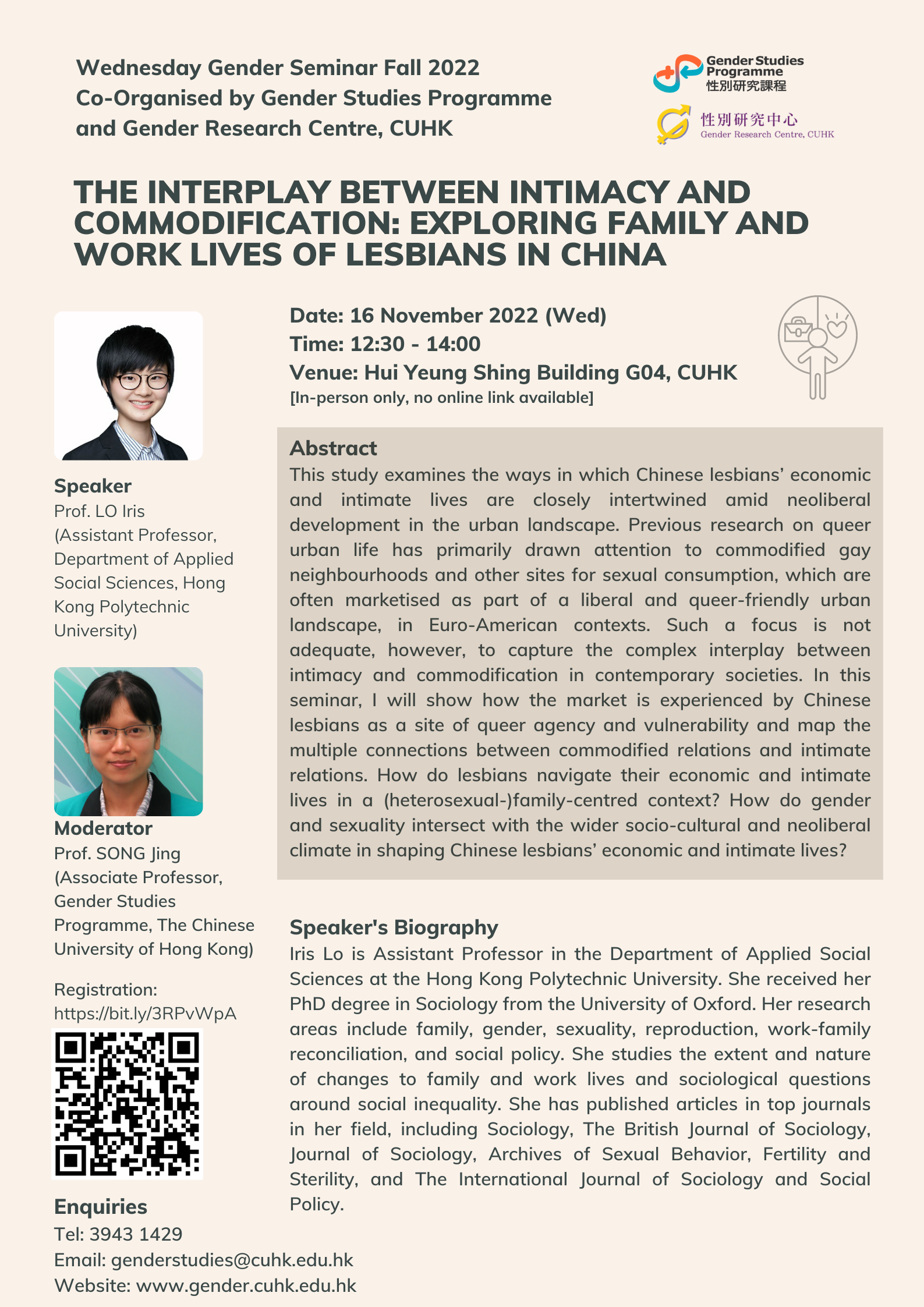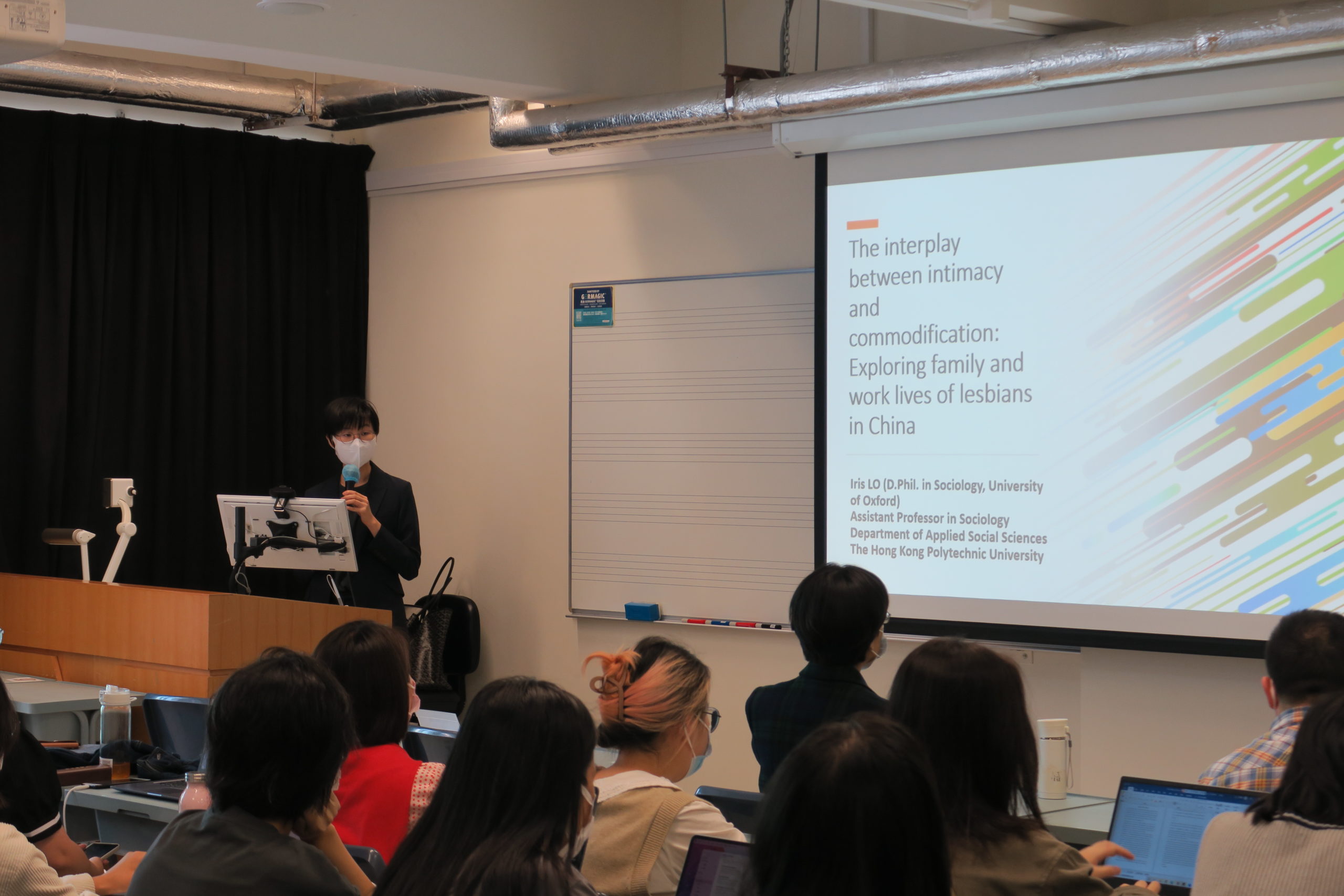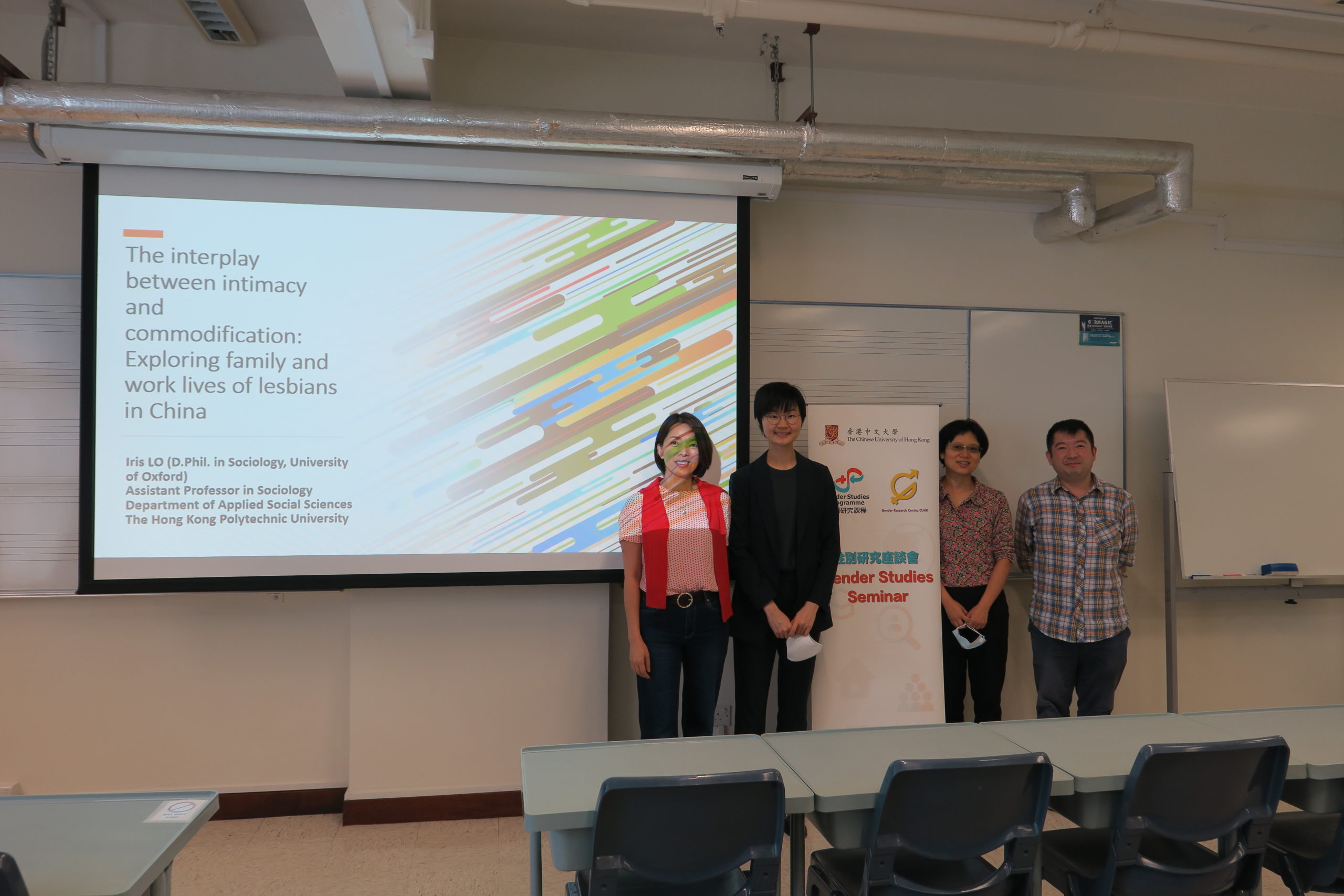Prof Lo’s presentation examines the ways in which lesbians explore opportunities and navigate constraints in their family and work lives in urban China. Research reveals that the interconnection between the economic and intimate life of lesbians in modern cities is commodified. They not feel empowerment through navigate lives in work and pink market as resourceful consumers, but also intersecting with sociopolitical and neoliberal power with their everyday practices on a larger background.
Although the respectable queer citizens could make relatively free expression of their sexual identity through the consumption of commodities and capital, opportunities to subvert traditional gender expectations carry a high price tag, which could be unaffordable for many economically disadvantaged lesbians. The hidden danger here is that commercial logic may cover personal voice. That is it transforms feminism from a political movement to a non-politicized product and personal attitude. And the paper also point out that lesbians also face the hinders in the labour market. Except from fashion field, in which sexual minorities have their own traffic(自带流量). In most workplaces, lesbians are cautious about disclosing their sexual orientation because of the fear of discrimination and prejudice. It inspire us to think how gender norms, heteronormativity, and policy intersect in generating obstacles for Chinese lesbians to thrive as respectable adult workers. This has important implications for further attempts to help adult worker to fit better with people’s diverse work /family needs.
Despite from everyday practices and interactions,there’s also need to observe the penetration of digital media into daily life. And it is easy to find that in many mon-homosexual-oriented social media software in China, lesbians have less visibility compared with gays, which is similar to the second point of the article’s research gap.
Written by: XU Yinuo
On November 16, the topic of professor LO’s speech was the interplay between intimacy and commodification by exploring the family and work lives of lesbians in China.
She began her speech with the research objectives and the research question, which were how do Chinese lesbians navigate their economic and intimate lives in a context where same-sex relationships are yet to be socially or legally recognized, and how do gender and sexuality intersect with the wider socio-political and neoliberal climate in shaping Chinese lesbians’ economic and intimate lives. The main research gaps were underground queer scenes in more restrictive contexts, everyday practices in commodification and sexuality, and Chinese lesbians.
After introducing the challenges and opportunities of the queer community, the rise of queer desires, and the pink market, she told us her research method is an in-depth interview about well-educated lesbians in Beijing. There were three findings. Firstly, participants’ intimate lives are ‘commodified’, because their choices about intimacy and same-sex marriage are related to the workplace and pink market. Secondly, the ways they use to avoid gendered and sexual obstacles in the labor market by hiding or fictitious their sexual orientation, gender expression, and marital status are ‘commodified’. Thirdly, most participants’ strategies to accommodate and/or resist established norms are finding their own comfort zone.
In conclusion, this research showed how commodification and intimacy interact with each other, and the dilemma of Chinese lesbians that they must get a decent job to have the life they want, but due to the gendered and sexual obstacles, they cannot openly lead the life they want.
Written by: ZHANG Yue
At the talk on 16 November 2022, Prof. LO Iris shared her project, “the Interplay between Intimacy and Commodification: Exploring Family and Work Lives of Lesbians in China.” Based on the in-depth interviews with lesbians living in Beijing, she delved into the economic and intimate lives of lesbians in the Chinese urban landscape and weaved it with the political and neoliberal atmosphere in China.
She proposed that 1978 is the watershed compared with previously stigmatized, although not illegal, queer living circumstances, allowing the new exploration of queer subjectivities. Queer people were shaped by middle-class cosmopolitan values that encouraged them to pursue their material and emotional desire without transgressing social norms or challenging the limitation that the government set. During the interview, Prof. LO found that urban lesbians were eager to enter the labour market to gain enough money to become respectful citizens, capable workers, and resourceful consumers. And they expected this would bring them more freedom and subjectivity to their sexual orientation.
However, Prof. LO also found that the queer agency that the market brought was always intertwined with vulnerability. The strategies that lesbians adopted to sustain decent jobs providing the economic foundation for the life they wanted may also reinforce the gender and sexual orientation hierarchy. For instance, lesbians must be cautious about disclosing their sexual orientation in the workplace. They would try to hide their sexual orientation and pretend to be heterosexual. They would constantly come across the question of why they still stay single and even need to lie to their colleagues that they have got married to a heterosexual man or try to perform a traditional social script of femininity. Also, although they were determined to commodify their labour power, there was no guarantee they could earn as much money as expected since the gender wage gap still exists.
In the open discussion, several valuable and debatable points were highlighted. For instance, does the commodification in the research refers to labour or intimacy? Is the theoretical framework expandable to other Chinese intimacy phenomena, like dating shows? Is the concept of intimacy proper to explain the performance of gender norms and the interest in personal life in the workplace? Is earning enough money truly free lesbians from parents’ expectations of heteronormative life?
Written by: ZHENG Lin





A
A
A
Contact Us